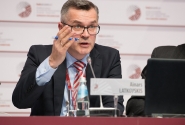
On Thursday, 5 March, Ainars Latkovskis, Chairman of the Defence Committee of the Saeima, opened the second session of a high-level foreign policy and security conference dedicated to better cooperation between the EU and NATO in view of new security challenges. He pointed out that since 22 of EU member states are also members of NATO, these states share one pool of defence resources in order to achieve the military goals of both organisations. Therefore, closer cooperation and coordination between the EU and NATO in areas such as planning of defence capabilities and military training are particularly important.
The Interparliamentary Conference for the Common Foreign and Security Policy and the Common Security and Defence Policy held in Riga on 5–6 March is one of the six interparliamentary events organised by the Saeima within the framework of the parliamentary dimension of the Latvian Presidency of the Council of the EU.
Latkovskis also emphasised the need to coordinate the planning of the EU and NATO capabilities in a manner that avoids needless duplication of efforts. The training offered by both organisations should be continually synchronised. For example, approximation and synchronisation of certification training of EU’s Battlegroups and NATO’s Rapid Response Force would generate added value.
The Chairman stressed the need for a closer cooperation in the area of strategic communication between the EU and NATO since the EU has to work on broadening its communication regarding its vision; the NATO Strategic Communication Centre in Riga can facilitate cooperation in this regard.
In conclusion, Latkovskis noted that Russia’s aggression in Ukraine has clearly revealed an unofficial separation of duties between both organisations – the EU is actively using political and economic instruments, while NATO is strengthening security in its member states. This separation of duties also demonstrates the strengths of each organisation and thus indicates the direction for their future activities.
Saeima Press Service







